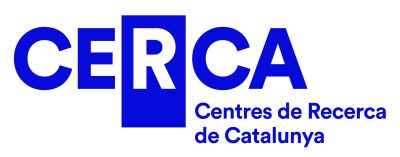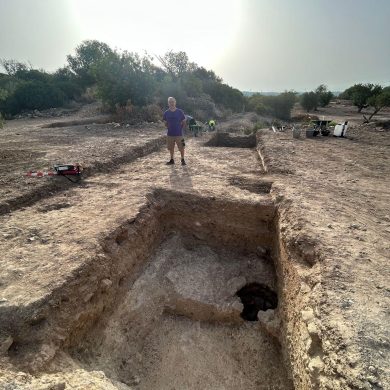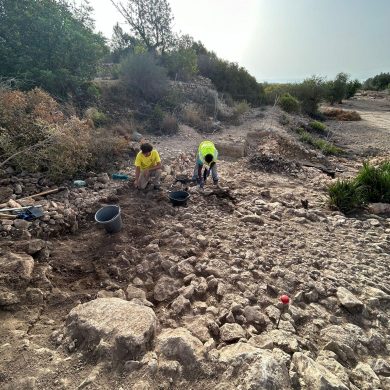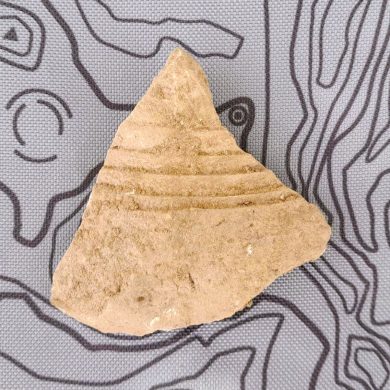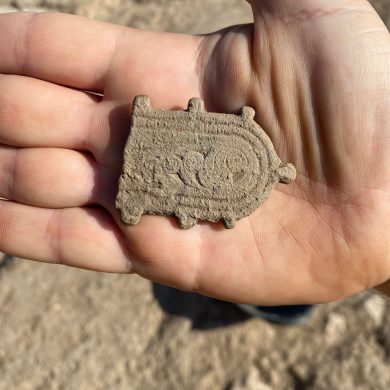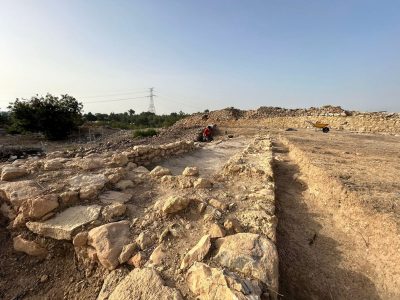
The archaeological campaign in Valencia “la Vella” peaks with the VII Practical Course on Christian and Visigothic Archaeology and a new edition of the Conference Cycle.
On June 28, the first part of the excavations at the Valencia “la Vella” site was completed. It took place from June 17 to 28 with the participation of the company Global Mediterranea, to whom we are grateful for their involvement once again in this exceptional site.
This is the ninth archaeological campaign we have carried out at the Valencia “la Vella” site, with the support of the Riba-roja de Túria City Council and the Department of Culture of the Diputación de Valencia.
The ninth archaeological campaign in València “la Vella” has included the participation of Newcastle University
In this phase, the Late Antiquity and Christian Archaeology team from the MIRMED research group focused on machine excavation of a large area near the wall, where last year some stairs were found due to the existing slope at that point. This has allowed the identification of several spaces near the wall, with promising prospects for future excavation. Additionally, the presence of several walls of tens of meters in length and possible circulation areas raises questions about the functionality of this zone: military, productive, or residential.
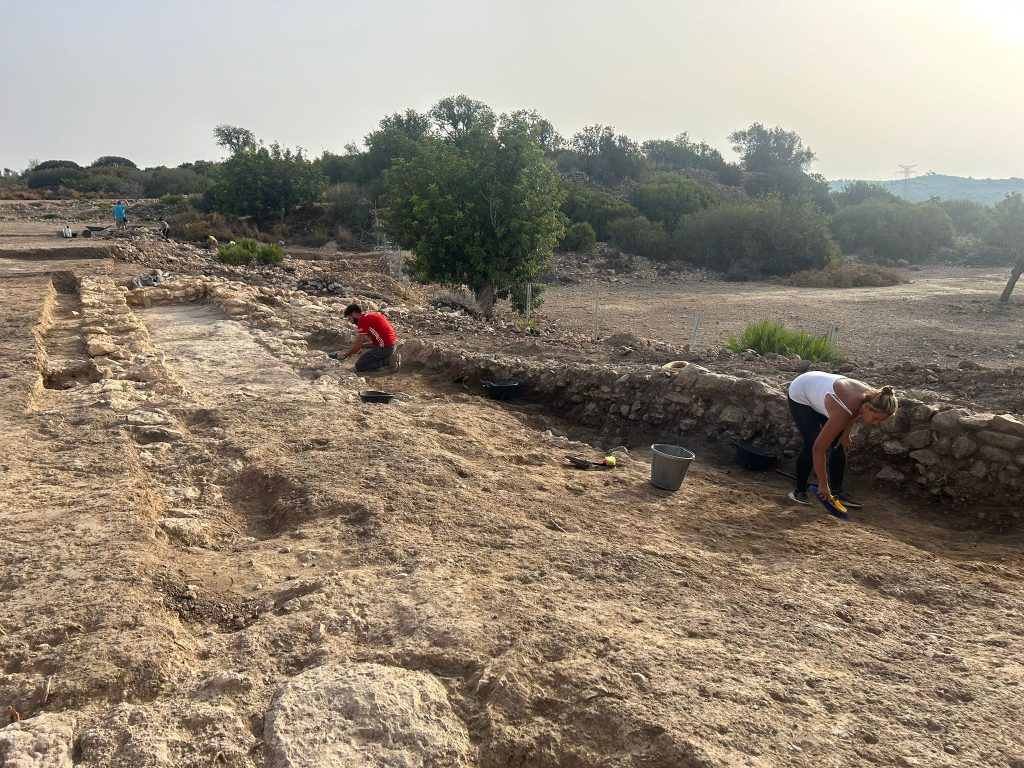
Very close by, another survey was initiated, where a longitudinal cut of a large part of the natural rock was made to level the area, resulting in well-defined terraces following the area’s topography.
In both zones, the team documented massive stone structures associated with archaeological levels containing paleo-Andalusian material (8th-9th centuries AD), which are of great interest for understanding what happened in Valencia “la Vella” after the fall of the Visigothic Kingdom.
In the last days of the campaign, efforts focused on conditioning the site with mechanical means, removing agricultural soil, and marking new surveys.
The team has focused the excavation on a sector that provided very good results last year: sector 6100, very close to the 6th-century AD wall, where walls and a staircase began to be documented last year.
One of the objectives of these two weeks of the campaign has been to better understand the stratigraphic relationships of this area with the wall, as well as the functionality of the structures.
From July 1 to 19, València “la Vella” will host the VII edition of the Christian and Visigothic Archaeology Course (Riba-roja de Túria, Valencia). Twelve students will participate, three of whom are from the University of Valencia.
The València “la Vella” archaeology course is aimed at undergraduate or master’s students of history, archaeology, or related studies. During the course, excavation tasks, material classification, workshops, lectures, and visits to Late Antique sites in the area will be alternated.
These days will also see a new edition of the Conference Cycle organized by ICAC-CERCA and the Riba-roja de Túria City Council as part of the VII Course on Christian and Visigothic Archaeology of València “la Vella”. From July 2 to 18, the cycle will feature very interesting talks on various topics, given by experts in the Late Antique topic.
The conferences are open to a general audience and will be held in the El Molí Exhibition Hall (Riba-roja de Túria Castle) in Riba-roja de Túria. Free admission! You can check the schedule on this poster and in the ICAC-CERCA agenda.
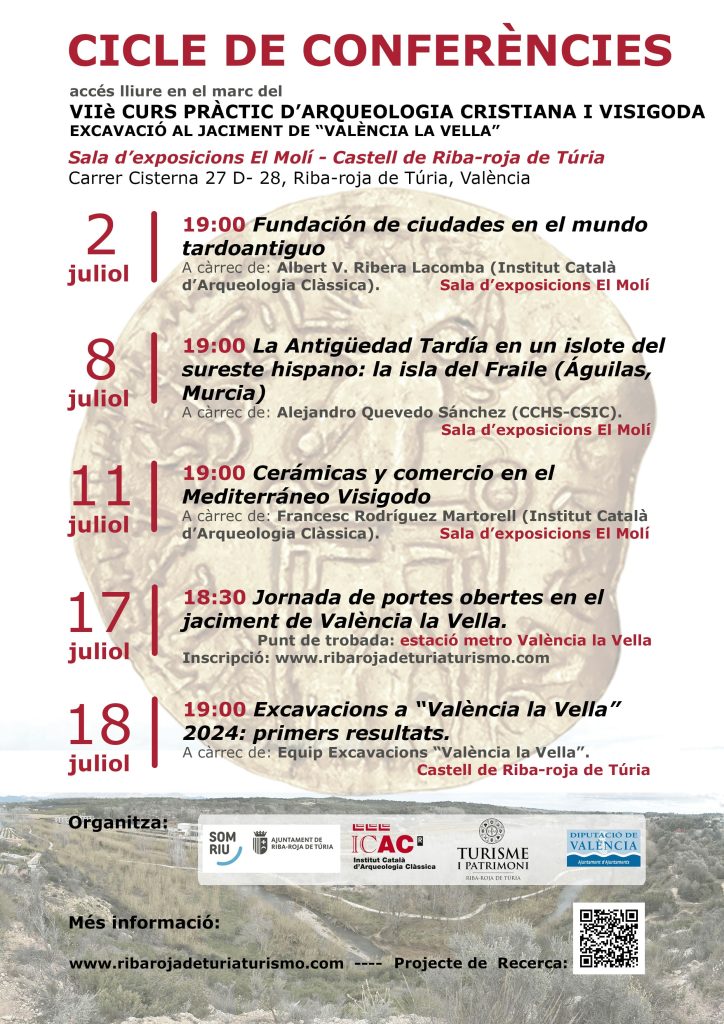
Finally, the archaeological campaign and the activities related to the Christian and Visigothic Archaeology Course in València “la Vella” have encouraged us to organize a new open day at the site on July 17th. If you want to attend, please register on the Riba-roja de Túria Tourism website. We look forward to seeing you there!
Follow the archaeological campaign’s activity on the social media of València “la Vella”!
View this post on Instagram
About the Catalan Institute of Classical Archaeology (ICAC-CERCA)
The Catalan Institute of Classical Archaeology (ICAC-CERCA) is a CERCA center established as a consortium in 2003 by the Government of Catalonia and the Rovira i Virgili University. It is a Catalan institution with an international scope, at the forefront of research and conservation of archaeological heritage. Its headquarters are in Tarragona, a city recognized as a UNESCO World Heritage Site in 2000. Its researchers work to understand the past through the study of archaeological remains and promote the preservation of the historical legacy. We are CERCA!
For more information, visit www.icac.cat.
